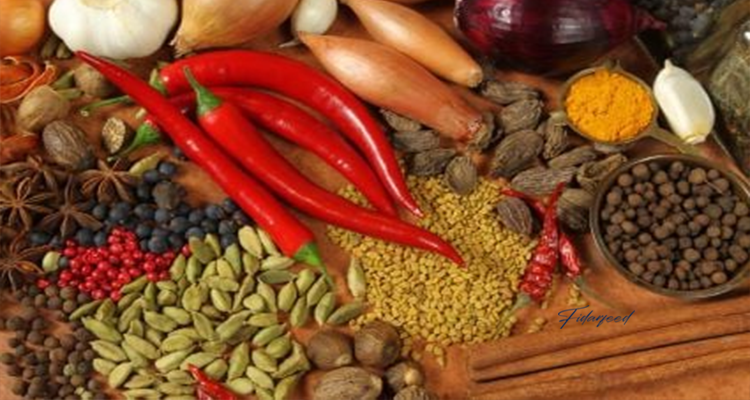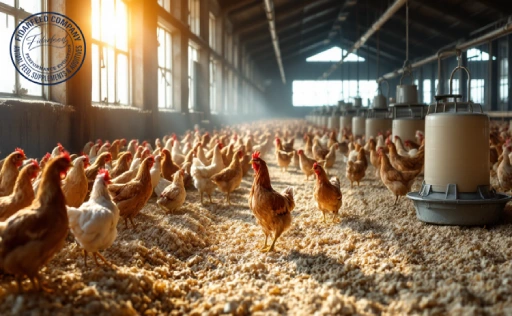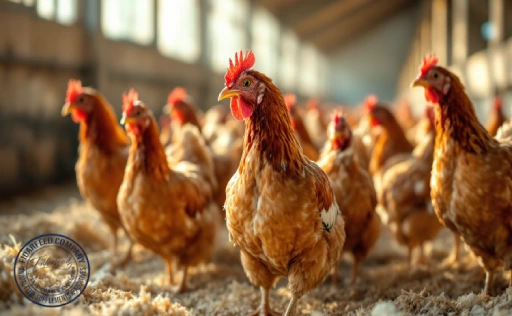Medicinal plants in broiler chicken nutrition are no longer a niche concept—they’re quickly becoming a practical and trusted alternative to synthetic additives and antibiotics. As poultry producers across the globe seek safer, more sustainable, and cost-effective solutions, herbs and botanicals are gaining recognition for their natural healing properties. Whether you’re an experienced broiler breeder or just getting started, understanding how to integrate medicinal plants into your feeding program can unlock powerful benefits for your flock.
In this article, we’ll break down why medicinal plants matter, highlight their benefits, introduce the most effective herbs, and provide actionable guidance based on real-world results and science-backed practices. Let’s explore how going herbal can revolutionize your broiler production.
Why Medicinal Plants Matter in Broiler Chicken Nutrition
The increasing global demand for antibiotic-free poultry and clean-label food has pushed broiler farmers to seek safer, more natural feed additives. Medicinal plants—used for centuries in traditional remedies—are now proving to be effective in modern poultry farming.
Learn more about: Active Probiotic Yeast for Poultry
Phytogenic feed additives (PFAs), derived from herbs, spices, and essential oils, offer antibacterial, antiviral, antifungal, and anti-inflammatory properties. Their use in broiler diets not only supports bird health but also aligns with global moves toward sustainable and residue-free farming practices.
But beyond regulation and consumer demand, many farmers are personally motivated by the chance to reduce mortality, improve performance, and minimize drug resistance on their farms—all while supporting natural growth.
Top Benefits of Using Medicinal Plants in Broiler Diets
Medicinal plants can work wonders when included in poultry feed—both in terms of bird welfare and business outcomes.
-
Immune Support: Herbs like garlic and turmeric stimulate the immune system, helping birds resist infections without the need for synthetic drugs.
-
Digestive Aid: Many medicinal plants promote better digestion by balancing gut microbiota and enhancing enzyme secretion.
-
Growth Promotion: Studies show improved weight gain and feed conversion ratios in broilers fed with herbs like oregano and thyme.
Learn more about: Optimum Broiler Development Guide: From Chick to Market-Ready Bird
-
Anti-inflammatory and Antioxidant Effects: These properties help reduce oxidative stress in poultry, which is vital during stressful periods like vaccinations or transport.
-
Natural Disease Control: Instead of masking symptoms, medicinal plants can address underlying causes of illness in a preventive and holistic way.
Overall, the use of herbal additives is about achieving better productivity with fewer risks.
Most Effective Medicinal Plants for Broiler Chickens
Not all herbs are created equal. Based on scientific research and practical field applications, here are some of the most impactful medicinal plants for broiler chickens:
-
Oregano: Rich in carvacrol and thymol, oregano has strong antimicrobial properties. It helps prevent infections and promotes gut health.
-
Garlic: A natural antibiotic, garlic boosts the immune system, improves digestion, and even enhances meat quality.
-
Turmeric: Contains curcumin, a potent anti-inflammatory and antioxidant compound. Supports liver function and metabolic health.
Learn more about: Which Broiler Breed is the Best? A Comprehensive Guide for Farmers
-
Thyme: Known for its antibacterial and antifungal activity. It also improves feed palatability and gut flora.
-
Cinnamon: Aids in controlling pathogenic bacteria while stimulating digestion and blood circulation.
-
Fenugreek: Enhances appetite, boosts digestion, and may reduce blood cholesterol in poultry.
These herbs can be used individually or combined in custom formulations based on specific farm needs.
How Medicinal Plants Improve Feed Efficiency and Growth Rates
Medicinal plants in broiler chicken nutrition optimize feed efficiency by improving nutrient utilization and supporting digestive health. Phytochemicals in herbs stimulate the secretion of digestive enzymes and stabilize intestinal microflora, which means better absorption of proteins, fats, and minerals.
Learn more about: Complete Guide to the Management of Breeding Stock and Broilers
For instance, a study published in the Journal of Applied Poultry Research showed that broilers supplemented with oregano oil had significantly better feed conversion ratios (FCR) compared to those on standard diets. This translates directly to lower feed costs and higher profits.
In short, herbs help birds get more out of every bite—naturally.
Replacing Antibiotics: Are Medicinal Plants a Viable Alternative?
Yes, and the evidence is growing. With antibiotic resistance becoming a global crisis, many broiler producers are under pressure to reduce or eliminate antibiotics from their programs.
Medicinal plants offer a viable and safe alternative. For example, garlic and cinnamon extracts have been shown to inhibit E. coli and Salmonella, two common poultry pathogens. Herbs don’t just suppress symptoms—they actively support the immune system and promote resilience.
While medicinal plants may not completely replace antibiotics in every scenario, they significantly reduce the need for them when used as part of a well-designed health and nutrition plan.
Incorporating Medicinal Plants into Broiler Feeding Programs
Integrating herbs into your feed plan doesn’t have to be complicated. Here’s how to get started:
-
Choose the Right Form: Use powders, dried herbs, extracts, or essential oils—depending on your system and preference.
-
Start with Small Dosages: Always begin with recommended minimum doses to monitor responses before scaling up.
-
Mix Evenly: Ensure herbs are uniformly distributed in the feed or water to prevent over- or under-dosing.
-
Consult a Nutritionist: Especially when combining herbs, to avoid interactions or over-supplementation.
-
Monitor Results: Track FCR, weight gain, mortality, and general behavior over a few weeks to assess impact.
Consistency is key. Herbal solutions are most effective when used regularly, not just as a one-time fix.
Challenges and Considerations When Using Medicinal Plants in Poultry Nutrition
While promising, herbal feed additives come with a few considerations:
-
Quality Variability: Active compounds in herbs can differ based on origin, season, and processing method.
-
Standardization: Unlike synthetic additives, herbal products often lack uniformity unless properly standardized.
Learn more about: How to Breed Broilers at Home: A Step-by-Step Beginner’s Guide
-
Interaction with Other Additives: Always check for possible reactions with other supplements or medications.
-
Cost Concerns: Some high-quality herbs may seem more expensive upfront but often yield better ROI over time.
To avoid these pitfalls, work with trusted suppliers and monitor flock responses closely.
Case Studies and Success Stories from Broiler Breeders
In multiple broiler operations, producers have reported notable improvements after switching to herbal supplements:
-
A breeder who introduced garlic powder and oregano oil into starter feed saw a 12% reduction in mortality and improved litter quality within two cycles.
-
Another farm using thyme and turmeric as a preventive measure during the cold season recorded fewer respiratory issues and better average daily gains.
These stories show that medicinal plants aren’t just theory—they deliver results in real production settings
Learn more about: Mastering the Basics: A Comprehensive Broiler Breeder Management Guide
Future Trends: The Role of Medicinal Plants in Sustainable Poultry Farming
The future of poultry nutrition is green—and herbal.
As global markets move toward antibiotic-free meat and sustainability-focused practices, medicinal plants will play a central role. Ongoing research is expanding our understanding of phytogenic feed additives, and innovations in extraction and formulation are making them more effective and accessible.
Herbs also align with consumer preferences for natural products, giving farmers a competitive edge in increasingly conscious markets.
Final Thoughts: Choosing the Right Medicinal Plant Strategy for Your Broiler Farm
There’s no one-size-fits-all formula. The key is to start small, observe closely, and scale wisely.
-
Consider your farm’s specific challenges—be it disease prevention, growth promotion, or antibiotic reduction.
-
Select the herbs that address those needs.
-
Partner with experts who understand both herbal science and poultry nutrition.
Medicinal plants in broiler chicken nutrition offer a natural, effective, and forward-thinking solution for today’s feed challenges. Whether you’re aiming to boost profits, reduce antibiotics, or raise healthier birds, herbal strategies are worth exploring.
We’d love to hear from you!
Have you tried using herbs in your broiler feeding program? What worked best for you? Share your thoughts, questions, or experiences in the comments below—we’re here to learn and grow together.










2 Comments. Leave new
Wow, this was an incredibly useful read! The information you’ve shared is not only practical but
also perfectly timed for anyone trying to improve their health.
I really appreciate how you explained it all so clearly.
I’m going to share this article on my own blog
about nutrition and wellness – I know my audience will find
it just as valuable. Thanks for the great work
“Thank you! I’m glad you found the article helpful and appreciate you sharing it with your audience. Your support means a lot!”